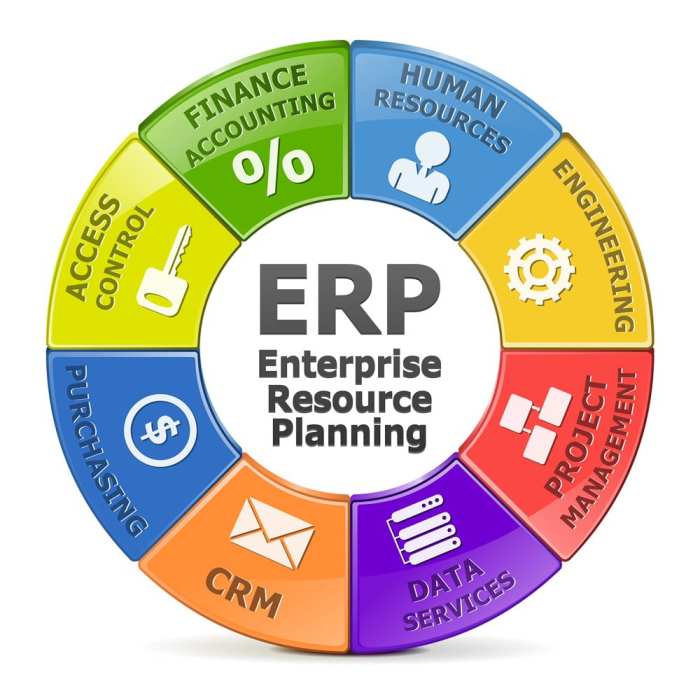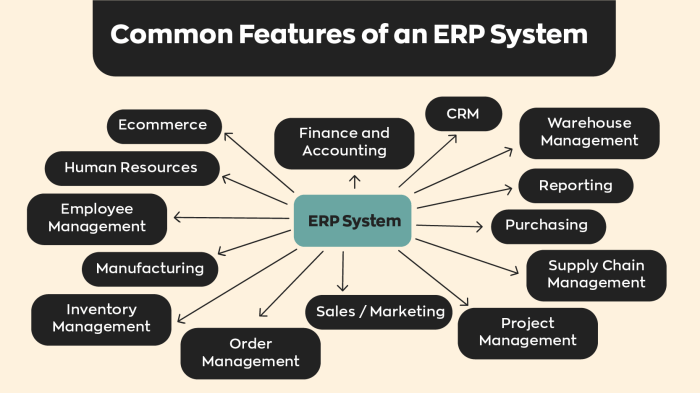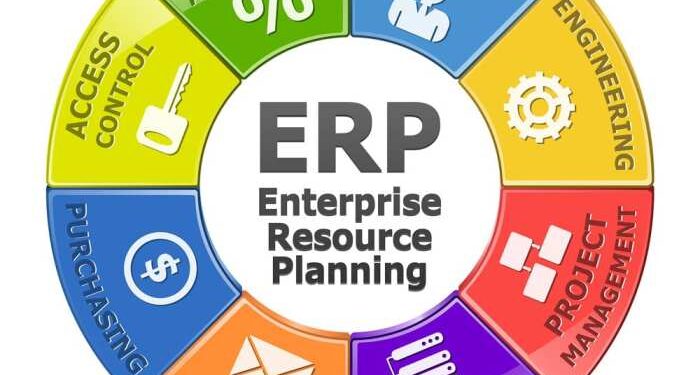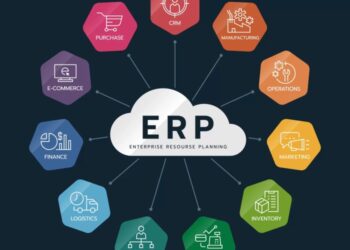ERP platform sets the stage for this enthralling narrative, offering readers a glimpse into a story that is rich in detail and brimming with originality from the outset. From defining what an ERP platform is to exploring its key features and implementation challenges, this topic delves into the heart of modern business operations.
Overview of ERP Platform

An ERP (Enterprise Resource Planning) platform is a software system that integrates various functions within a business, such as accounting, human resources, inventory management, and customer relationship management. It allows for the streamlining of processes and data across departments, providing a centralized platform for information management.Using an ERP platform is significant for businesses as it helps improve efficiency, increase productivity, enhance decision-making capabilities, and reduce operational costs.
With real-time data access and insights, organizations can make informed decisions and adapt quickly to changing market conditions.
Popular ERP Platforms
- SAP ERP: A widely-used ERP system known for its robust features and scalability.
- Oracle ERP Cloud: Offers a suite of cloud-based ERP applications for various industries.
- Microsoft Dynamics 365: Combines ERP and CRM capabilities in a single platform.
- NetSuite: A cloud-based ERP solution designed for small to medium-sized businesses.
Features of ERP Platform
ERP platforms offer a wide range of features designed to streamline business operations, enhance efficiency, and improve overall productivity. These features are essential for managing various aspects of a business seamlessly, from financials to supply chain management.
Key Features of ERP Platforms
- Financial Management: ERP platforms provide tools for managing financial processes such as accounting, budgeting, and financial reporting.
- Supply Chain Management: These systems help optimize supply chain processes, including inventory management, procurement, and order fulfillment.
- Human Resources: ERP platforms offer modules for managing HR functions like payroll, benefits administration, and employee development.
- Customer Relationship Management (CRM): ERP systems often include CRM functionalities to track customer interactions, sales, and marketing efforts.
- Reporting and Analytics: ERP platforms provide robust reporting capabilities and analytics tools to gain insights into business performance and make data-driven decisions.
How ERP Features Streamline Business Operations
ERP features help businesses streamline operations by centralizing data, automating processes, and improving collaboration across departments. By providing a unified platform for managing various functions, ERP systems eliminate silos and enable real-time visibility into business processes. This leads to improved decision-making, increased efficiency, and reduced operational costs.
Cloud-based ERP vs. On-premise Solutions
- Accessibility: Cloud-based ERP platforms offer remote access to data and applications, allowing employees to work from anywhere. On-premise solutions, on the other hand, require physical access to the system.
- Scalability: Cloud-based ERP systems are often more scalable, allowing businesses to easily adjust resources based on their needs. On-premise solutions may require hardware upgrades for scalability.
- Cost: Cloud-based ERP solutions typically have lower upfront costs and ongoing maintenance expenses compared to on-premise solutions, which require significant investments in hardware and IT infrastructure.
- Security: Both cloud-based and on-premise ERP solutions can be secure, but cloud-based systems offer enhanced security measures and frequent updates to protect data from cyber threats.
Implementation of ERP Platform
When it comes to implementing an ERP platform, there are several key steps that organizations need to follow in order to ensure a successful deployment.
Steps involved in implementing an ERP platform:
- Planning and Preparation: This phase involves defining the scope of the project, setting goals, and creating a project plan.
- System Selection: Organizations need to carefully evaluate different ERP systems to choose the one that best fits their needs.
- Data Migration: Data from existing systems needs to be migrated to the new ERP platform in a structured and organized manner.
- Customization and Configuration: The ERP system needs to be customized and configured to meet the specific requirements of the organization.
- Testing: Extensive testing is crucial to identify and resolve any issues before the system goes live.
- Training: Proper training of employees is essential to ensure a smooth transition to the new ERP platform.
- Go-Live and Support: The ERP platform is launched, and ongoing support is provided to address any issues that may arise.
Best practices for successful ERP platform deployment:
- Strong Leadership and Communication: Clear communication and strong leadership are essential throughout the implementation process.
- Engage Stakeholders: Involving key stakeholders in the decision-making process can help ensure buy-in and support for the new ERP platform.
- Change Management: Implementing an ERP platform often involves significant changes, so organizations need to have a structured change management plan in place.
- Continuous Improvement: Organizations should continuously evaluate and refine their ERP system to optimize performance and efficiency.
Challenges that organizations may face during ERP implementation:
- Resistance to Change: Employees may resist the new system, leading to difficulties in adoption and usage.
- Data Integration: Integrating data from various sources can be complex and challenging.
- Budget and Timeline Overruns: ERP implementations are often more costly and time-consuming than initially planned.
- Lack of Expertise: Organizations may lack the necessary expertise to effectively implement and manage the new ERP platform.
Integration with ERP Platform
Integrating other software systems with an ERP platform is crucial for streamlining business processes and maximizing efficiency. By connecting various systems, organizations can centralize data, automate tasks, and improve communication across departments.
Examples of Software Systems for Integration
- Customer Relationship Management (CRM) software
- Supply Chain Management (SCM) software
- Human Resources Management (HRM) software
- Business Intelligence (BI) tools
Benefits of Seamless Integration
Seamless integration of software systems with an ERP platform offers several benefits for overall business efficiency:
- Improved data accuracy and consistency
- Enhanced decision-making through real-time data access
- Increased productivity by reducing manual data entry and duplication
- Streamlined processes and workflows across departments
- Cost savings by eliminating the need for multiple standalone systems
Customization and Scalability

Customization and scalability are crucial aspects to consider when selecting an ERP platform for a business. These features can greatly impact the efficiency and effectiveness of the system in meeting the unique needs of an organization.
Importance of Customization Options
Customization options in an ERP platform allow businesses to tailor the system to their specific requirements. This flexibility enables companies to align the ERP software with their existing processes, workflows, and business goals. By customizing the platform, organizations can optimize their operations and improve overall productivity.
Role of Scalability in Choosing ERP Platform
Scalability is another key factor to consider when choosing an ERP platform. A scalable system can grow and adapt to the changing needs of a business, whether it's due to expansion, increased workload, or evolving market demands. This ensures that the ERP platform can accommodate future growth and remain effective in the long term.
Examples of Industries Requiring Customization and Scalability
E-commerce
In the fast-paced e-commerce industry, businesses need an ERP platform that can be customized to handle large volumes of transactions and inventory management efficiently. Scalability is essential to accommodate seasonal spikes in sales and growth.
Manufacturing
The manufacturing sector requires customization to integrate complex production processes and supply chain management into the ERP system. Scalability is crucial to adapt to changing production demands and market trends.
Healthcare
Healthcare organizations need customized ERP solutions to meet regulatory requirements, manage patient data securely, and streamline operations. Scalability is vital to handle the growing patient population and evolving healthcare technologies.
Conclusion
In conclusion, ERP platforms stand as technological pillars that revolutionize how businesses operate, enabling seamless integration, customization, and scalability. As organizations navigate the complex landscape of digital transformation, embracing ERP platforms becomes not just a choice but a necessity for sustainable growth and efficiency.
Essential Questionnaire
How can ERP platforms benefit businesses?
ERP platforms help businesses streamline operations, improve efficiency, and enhance decision-making processes.
What are some popular ERP platforms in the market?
Some popular ERP platforms include SAP, Oracle, Microsoft Dynamics, and NetSuite.
Why is customization important in an ERP platform?
Customization allows businesses to tailor the ERP system to their specific needs, optimizing processes and increasing productivity.
What challenges can organizations face during ERP implementation?
Common challenges include data migration issues, resistance to change from employees, and integration difficulties with existing systems.
How does scalability impact the choice of an ERP platform?
Scalability ensures that the ERP platform can grow with the business, accommodating increasing data volumes and expanding operations without major disruptions.








![Best Construction ERP Software [2024 Edition]](https://health.bandungnews.id/wp-content/uploads/2025/10/Top-10-Best-Construction-ERP-Software-to-Use-in-2024-1-120x86.jpg)



